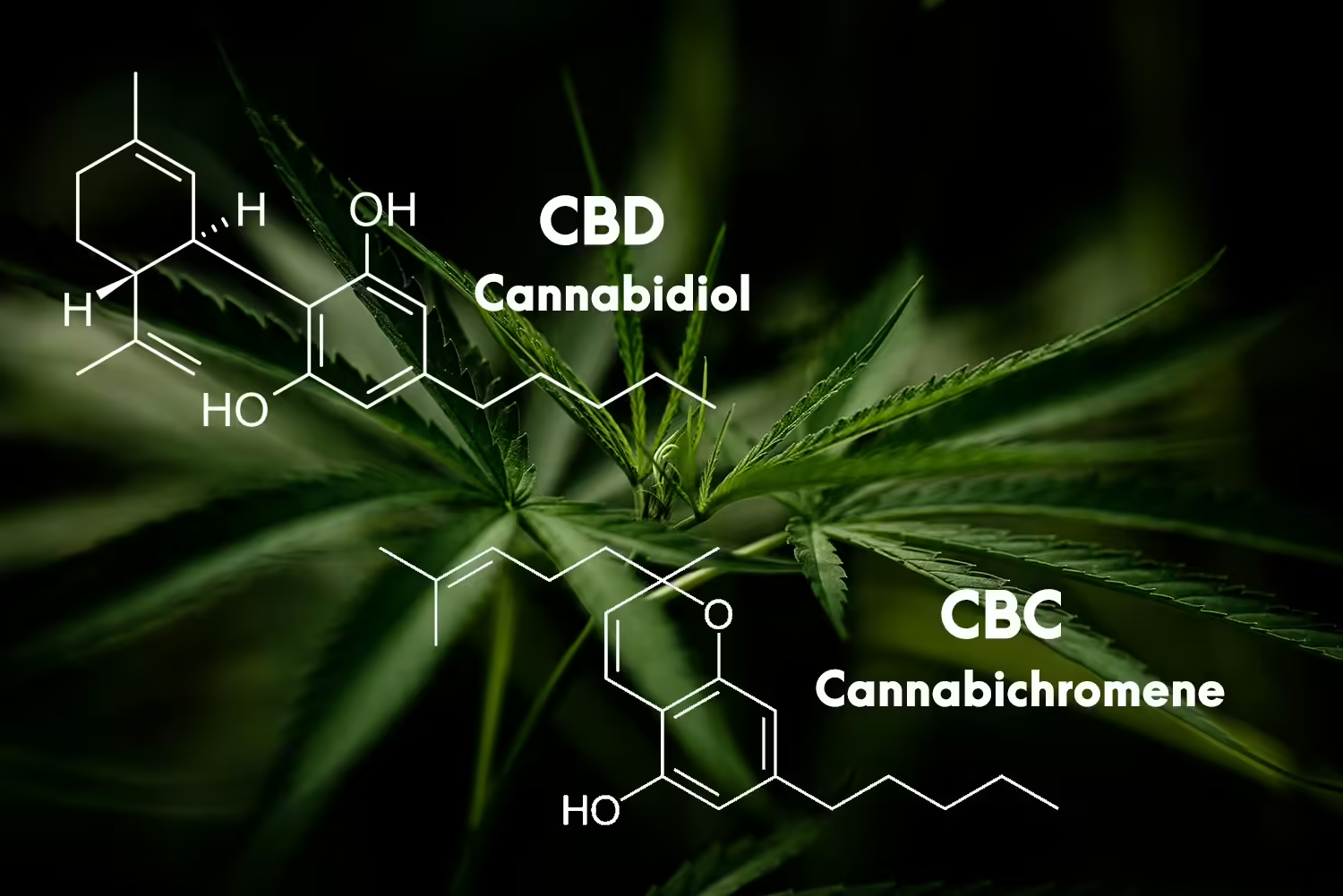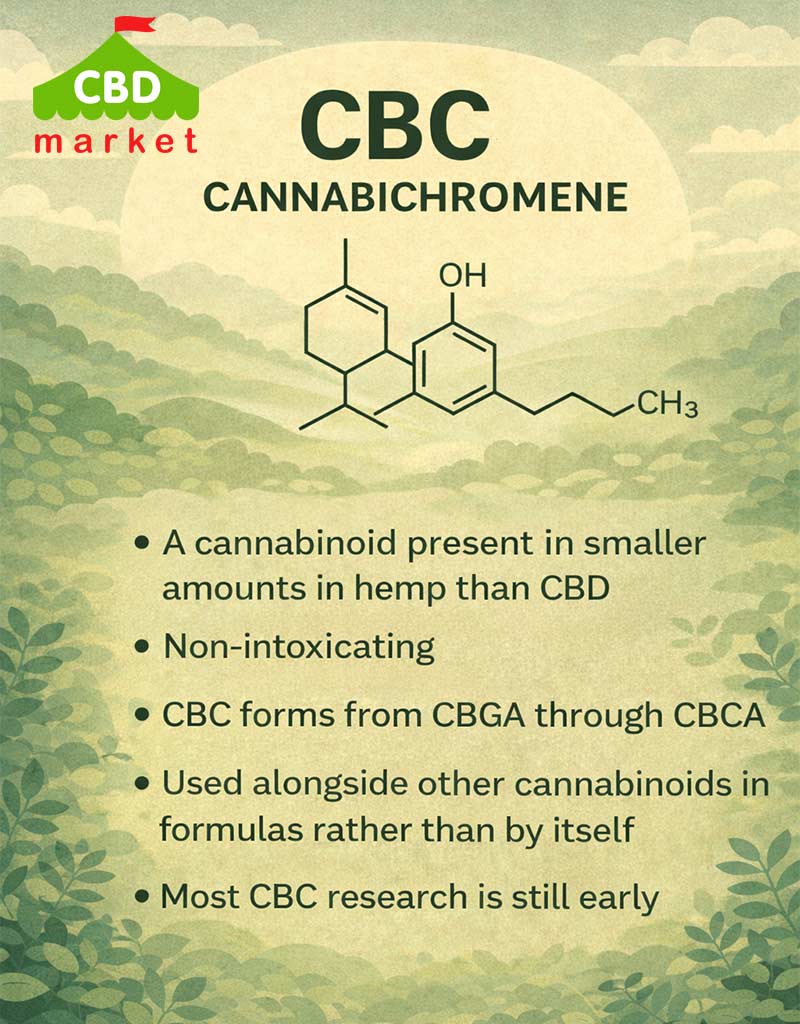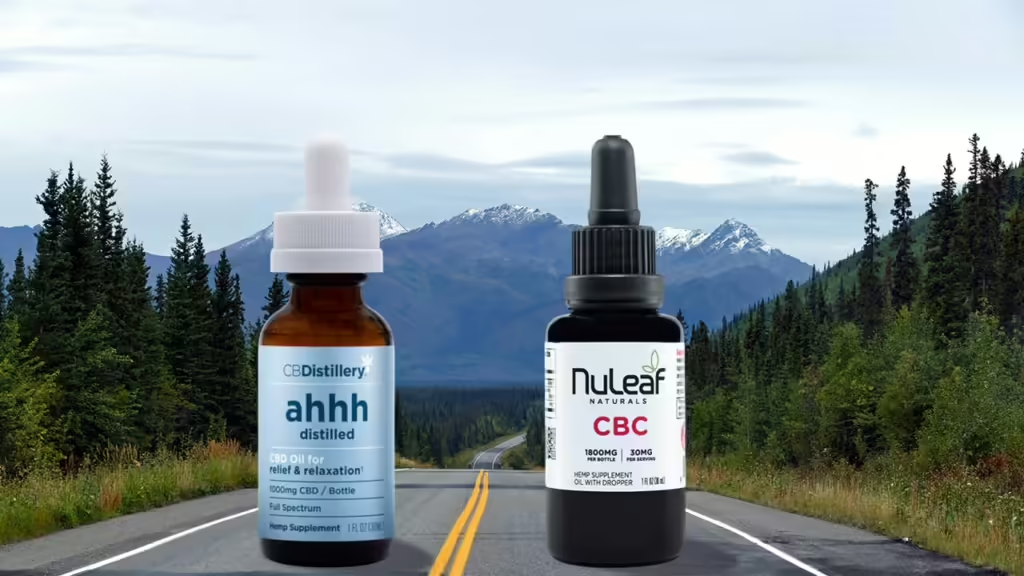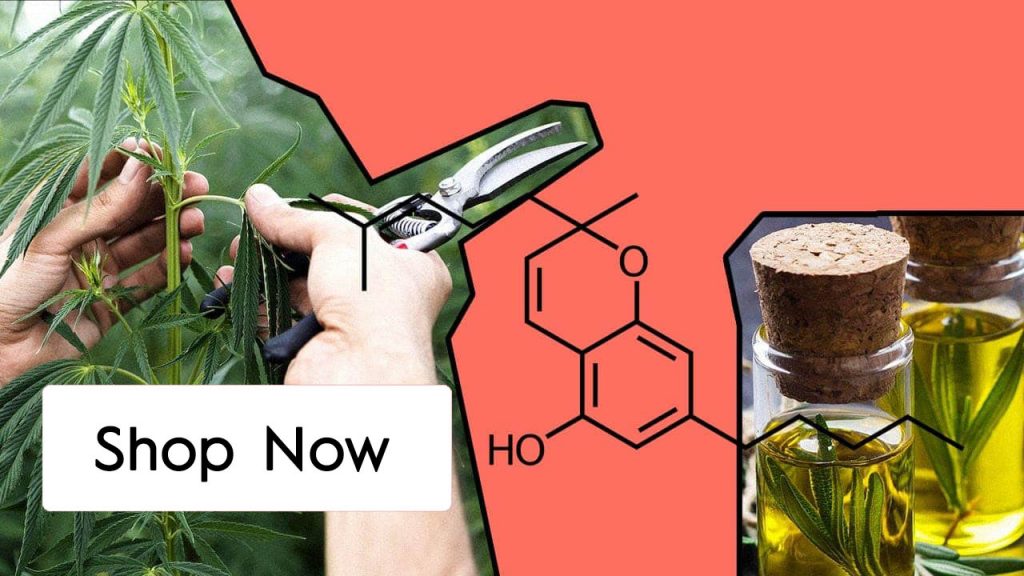What is CBC (Cannabichromene)?
Summarize

By now, many people are aware of what CBD and THC are. You might be wondering what CBC is. It’s important to acknowledge that there are multiple compounds within the hemp plant.

TL;DR (Too Long; Didn’t Read):
CBC (cannabichromene) is a naturally occurring cannabinoid found in hemp, usually in smaller amounts than CBD. It doesn’t create a “high” on its own and is often used alongside other cannabinoids.
Early research is still developing, so product results can vary by dose and your individual body chemistry.
Table of Contents
What is CBC?
CBC, short for Cannabichromene, is a non-intoxicating cannabinoid found in the cannabis plant and used to support the body’s supply of endocannabinoids that modulate appetite, sleep, and other body functions. CBC is a lesser-known cannabinoid found in the cannabis plant, but it still has great potential. Unfortunately, scientists have not researched CBС as much as CBD or other cannabinoids. THC has consumed significant resources over the years, as scientists and researchers have focused on its potential benefits and side effects. With recent changes in legislation, people have begun to look more closely at CBD and CBC.
CBC is produced through a process that occurs enzymatically in the plant’s trichomes. Cannabigerolic acid (CBGA) turns into cannabichromene acid (CBCA) using CBCA synthase. CBCA gets turned into CBC when it is exposed to heat through decarboxylation.
What Are Cannabinoids Exactly?
Cannabinoids include plant-derived compounds (phytocannabinoids) and compounds your body makes naturally (endocannabinoids). Endocannabinoids are produced in the body and act on cannabinoid receptors as part of the endocannabinoid system.
Scientists have identified more than 113 other cannabinoids. The most well-known is THC. Unfortunately, THC can also produce psychotropic impacts that most people don’t want to deal with.
Many other cannabinoids don’t contain THC or psychotropic side effects. It includes CBD, CBC, and CBG. The endocannabinoid system helps regulate various bodily functions and utilizes cannabinoids to maintain internal balance. While we naturally produce these cannabinoids, supplementation can help alleviate certain problems. Now, let’s discuss the differences between CBD and CBC.
CBD and CBC: What Are the Differences?
CBD (cannabidiol) and CBC (cannabichromene) are two different cannabinoids. CBD and CBC don’t have a substantial THC content, and a ‘high’ cannot be achieved.
They also act differently in the body. CBC shows activity at CB2 receptors in preclinical research and can act on TRP channels involved in cellular and sensory signaling, while CBD has a different target profile. Together, CBD and CBC may produce an entourage effect by working synergistically.
CBC and the Body
Scientists have identified two main cannabinoid receptors in the human body. They include the CB1 and CB2 receptors. Researchers have found that CB1 receptors are most commonly located within the brain, while CB2 receptors are more commonly found within immune cells and other tissues.
CBC has little activity at CB1, which is one reason it isn’t considered intoxicating like THC. Preclinical studies suggest CBC can activate CB2 receptors, meaning it may potentially influence endocannabinoid-related signaling through CB2 in certain contexts.
CBC may also act on non-cannabinoid targets, including TRP channels such as TRPA1 (and possibly TRPV1), which are involved in sensory and cellular signaling. In preclinical studies, CBC has been reported to affect endocannabinoid signaling, including by influencing how certain endocannabinoid compounds are inactivated, but changes in measured endocannabinoid levels are inconsistent across studies.
Potential Benefits of CBC Oils
Research on CBC is still developing. Most available findings come from laboratory studies, so real results can vary and may depend on individual factors.
1. Skin
Some people use CBC in topical routines to support the skin’s natural balance. CBC can potentially clear up skin issues by reducing the amount of sebum produced within the sebaceous glands. Increased sebum production is what causes breakouts in the first place. CBC can also reduce arachidonic acid levels in the body.
2. Bone Development
Regulating bone growth is beneficial for both children and adults. Early research has explored CBC in relation to overall bone health. It would be a useful supplement after an injury leading to a bone break or fracture.
3. Antibacterial Properties
A 1981 study by the University of Mississippi suggested that CBC has powerful antibacterial properties. It can help reduce the bacteria associated with E. coli and Staph. Fungi can also be reduced using CBC.
4. Mood Improvement
CBC is sometimes described as “uplifting” by users. CBC and other cannabinoids can affect mental stability and mood.
5. Relieving
While CBC is not as potent as THC and CBD, it can be used to fight discomfort. No side effects result in a ‘high’ when using CBC for relief.

FAQs
What Does CBC Do?
Early research suggests CBC may influence endocannabinoid-related signaling and other pathways involved in how the body regulates balance, including systems linked to immune activity, the skin barrier, and the way the brain processes chemical messages. However, human evidence is still limited, so its real-world effects can vary widely.
Will CBC Get You High?
CBC, like CBD, is not psychoactive. It will not cause you to feel “high.” It is due to its molecular structure that determines how it interacts with various receptors in the ECS system.
Does CBC Show Up on a Drug Test?
Standard drug tests typically look for THC metabolites, not CBC. CBC itself isn’t what these tests are designed to detect, but you can still test positive if the product contains THC (even in small amounts) or if there’s contamination or labeling inaccuracies, especially with full spectrum CBD products.
How Do You Choose a Quality CBC Product?
Look for reputable brands that provide a recent, batch-specific third-party Certificate of Analysis (COA) from an independent lab. The COA should confirm cannabinoid content (including any THC level) and include screening for common contaminants such as pesticides, heavy metals, residual solvents, and microbial impurities. The label should clearly state CBC per serving and total amount per container.
At the End
CBC is a non-intoxicating cannabinoid that’s still being studied. Most evidence so far comes from lab and animal research, and many CBC products also contain other cannabinoids, which can affect how a product feels. If you take medications or have a medical condition, it’s reasonable to check with a clinician before using cannabinoid products.
Sources
- https://www.ncbi.nlm.nih.gov/pmc/articles/PMC8658882/
- http://pharmrev.aspetjournals.org/content/62/4/588.short
- https://www.ncbi.nlm.nih.gov/pmc/articles/PMC6429381/
- https://www.ncbi.nlm.nih.gov/pmc/articles/PMC5292053/
- https://accp1.onlinelibrary.wiley.com/doi/abs/10.1002/j.1552-4604.1981.tb02606.x
- https://pmc.ncbi.nlm.nih.gov/articles/PMC6932936/
- https://link.springer.com/article/10.1186/s42238-021-00101-0
Share this post




Sucke1978
Does anyone know where I can buy CBC products? I haven’t come across anything like that in my area. I’m curious to try them.